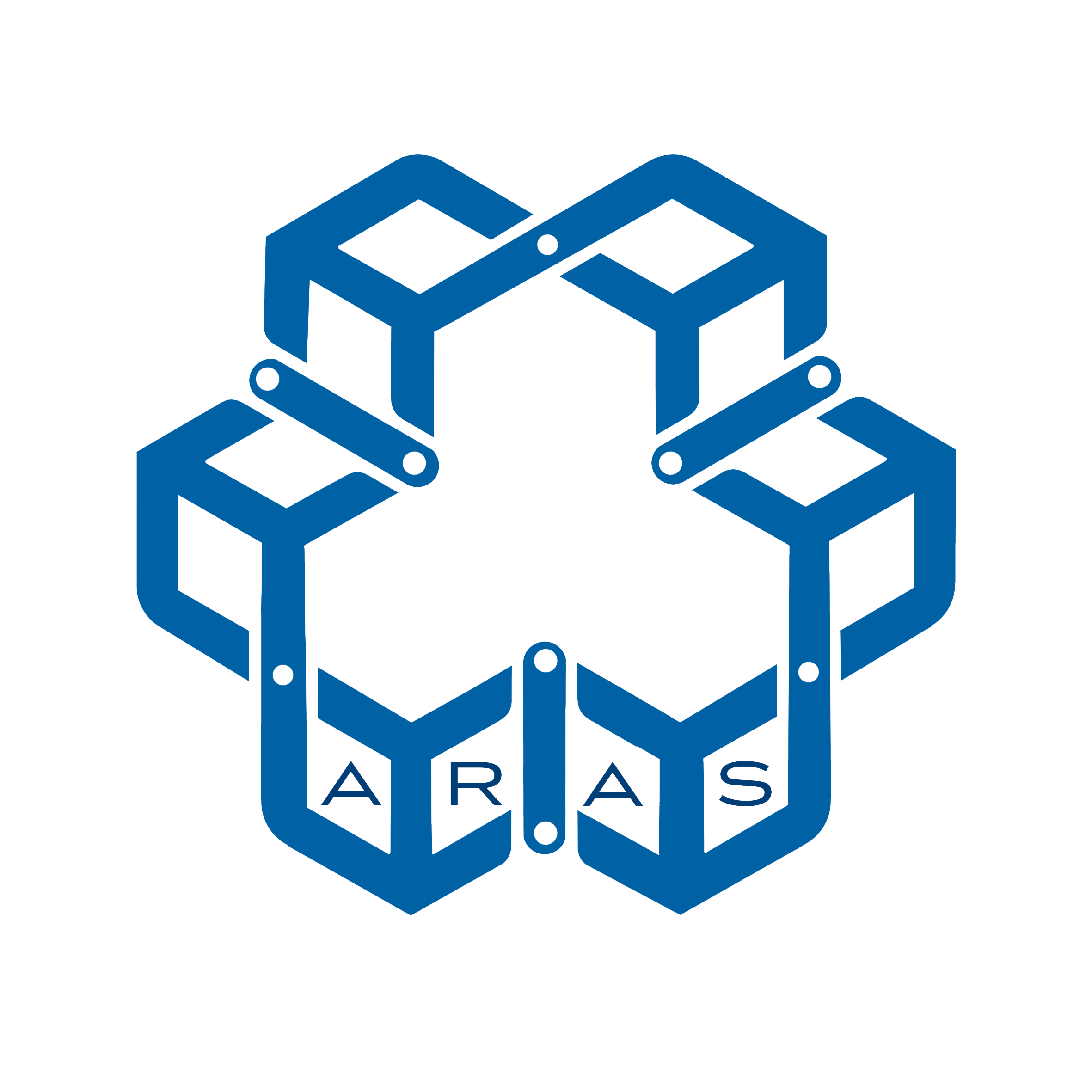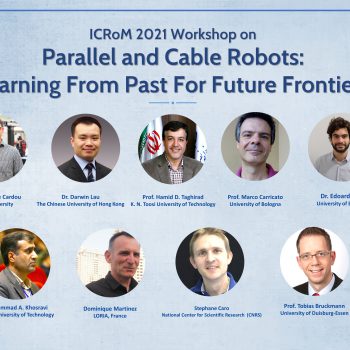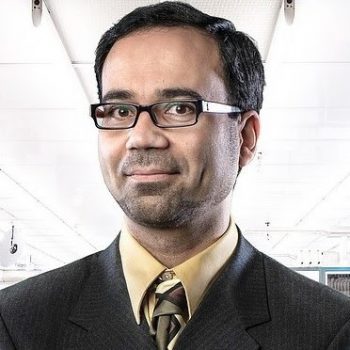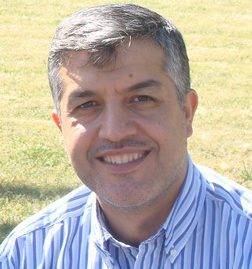ARAS Scientific Workshops
Parallel and Cable Robots: Learning From Past For Future Frontiers
Video:
Safeguarding Public Health During Infectious Disease Pandemics Using Medical Robotics, Wearable Technology, and AI
Abstract:
The focus of this workshop is on ways medical robotic systems, wearables, and AI technologies could augment, assist and support the healthcare system to safeguard public health and protect frontline healthcare workers during health crises such as the novel coronavirus pandemic. Of interests are:
-
Methods and devices to facilitate the prevention, containment, and mitigation of infectious diseases,
-
Novel means of telehealth/telemedicine for creating physical distancing between clinicians and patients,
-
Technologies for independent living of high-risk populations,
-
Social robotics for supporting mental health,
-
Wearables for monitoring COVID symptoms.
This talk will discuss the necessity and requirements of rapid reshaping of the rehabilitation services in response to COVID-19 outbreak. These services include the rehabilitation of patients recovering from severe COVID-19 with post-intensive care syndromes, including physical deconditioning and cognitive impairments, and other patients requiring physical therapy during the outbreak with no or limited access to hospital and rehabilitation centers. Considering the access barriers to quality rehabilitation settings and services imposed by social distancing and stay-at-home orders, these patients can be benefitted from access to affordable and good quality care through home-based rehabilitation. The success of such treatment will depend highly on the intensity of the therapy and effort invested by the patient. Monitoring patients’ compliance and designing a home-based rehabilitation that can mentally engage them are the key elements in home-based therapy’s success. The suggested structure of the new services includes both home-based solutions for enhancing the activities of daily living and an on-demand ambulatory rehabilitation unit for extensive training where it is possible to monitor both cognitive and motor performance of the patients remotely.
The Mission:
The overarching goal of this workshop is to create awareness among engineers, scientists, and medical professionals concerning how the world can be better prepared for the next pandemic, reducing the negative impacts on healthcare systems, healthcare workers, and patients.
The Venue:
- Iranian Conference on Electrical Engineering
- This workshop will be held online.
- Instructions on how to attend will be posted shortly.
- You may download the Workshop’s Schedule from here.
Date & Time: Monday, May 17, 2021 | Time: 17:00-21:00 (+4:30 GMT Tehran local time) | 8:30-12:30 (-4:00 GMT Canada Eastern Time Zone)
The Organizers:
The Speakers:

Dr. Hongliang Ren, Associate Professor, Chinese University of Hong Kong, Hong Kong
Hongliang Ren received his Ph.D. in Electronic Engineering (Specialized in Biomedical Engineering) from The Chinese University of Hong Kong (CUHK) in 2008. He serves as an Associate Editor for IEEE Transactions on Automation Science & Engineering (T-ASE) and Medical & Biological Engineering & Computing (MBEC). He has navigated his academic journey through the Chinese University of Hong Kong, Johns Hopkins University, Children’s Hospital Boston, Harvard Medical School, Children’s National Medical Center, United States, and the National University of Singapore. He is currently Associate Professor, Department of Electronic Engineering at the Chinese University of Hong Kong, and Adjunct Associate Professor, Department of Biomedical Engineering at the National University of Singapore. His areas of interest include biorobotics, intelligent control, medical mechatronics, soft continuum robots, soft sensors, and multisensory learning in medical robotics. He is the recipient of NUS Young Investigator Award and Engineering Young Researcher Award, IAMBE Early Career Award 2018, Interstellar Early Career Investigator Award 2018, and ICBHI Young Investigator Award 2019.
Dr. Mohsen Khadem, Lecturer, University of Edinburgh, UK
Mohsen Khadem is a UKRI Fellow and Lecturer at the School of Informatics at the University of Edinburgh. Previously He was a Post- Doctoral Researcher at the Wellcome/EPSRC Centre for Interventional and Surgical Sciences, University College London. He received his Ph.D. in Electrical and Computer Engineering from the University of Alberta, Canada in 2017, M.Sc. in Biomechanics from the Sharif University of Technology, Iran, in 2013, and B.Sc. in Mechanical Engineering from Shiraz University, Iran, in 2010. His research focus is on Surgical Robotics and Image-guided Therapies, Continuum and Flexible Robots, and Applications of Control Theory in Robotics.
Dr. Ravi Vaidyanathan, Reader, Imperial College London, UK
Dr. Ravi Vaidyanathan is a Reader in Biomechatronics in the Department of Mechanical Engineering at Imperial College London where he leads the Biomechatronics Laboratory. He earned his Ph.D. in biologically inspired systems at Case Western Reserve University (USA) and subsequently worked in industry, holding two directorships in control systems and medical engineering Prior to his post at Imperial, he completed a Senior Research Fellowship in Brain-Computer Interface at the University of Southampton, was a Research Assistant Professor of Systems Engineering at the US Naval Postgraduate School, and a Senior Lecturer in Biodynamics at the University of Bristol. His academic research has translated in a range industrial projects including several new ventures based on principles established in his laboratory.
Dr. Javad Dargahi, Professor, Concordia University, Canada
Dr. Javad Dargahi is a professor of mechanical engineering at the Department of Mechanical and Industrial Engineering, Concordia University, Montreal, QC Canada. He is a fellow of Canadian Society of Mechanical Engineering. His research interests are design and development of haptic and tactile systems for minimally invasive surgery, robotics, and micro-manufacturing of sensors and actuators. Professor Dargahi has co-authored three books published with McGraw-Hill and Wiley in the scope of mechatronics and tactile sensing. He has published more than 250 peer-reviewed articles, and is the inventor of multiple patented technologies in this field.
Dr. Ehsan Tarkesh Esfahani, Associate Professor, University at Buffalo, USA
Dr. Ehsan Tarkesh Esfahani is an Associate Professor in the Department of Mechanical and Aerospace Engineering at University at Buffalo, The State University of New York (UB). He is also a core faculty members in the Computational Data Science and Engineering program as well as center for Cognitive Science at UB. He received his PhD in Mechanical Engineering and MSc in Electrical engineering from University of California Riverside in 2012. Prior to joining academia, he was a research scientist at General Motors Research and Development Center. Dr. Esfahani’s main research is focused on Human-in-the Loop System, Human-in-the loop learning, physiological signal processing, human-robot interactions and medical robotics/training. His research work has received numerous awards from National Science Foundation, State of New York, Power Public Association, Roswell Park Cancer Institute to name a few. He is a senior member of IEEE and Associate editor of ASME Journal of Computing and Information Science Engineering and Guest Associate Editor for Frontiers in Neurorobotics.
Dr. Yaser Maddahi, President, CEO & Founder, Tactile Robotics, Canada
Dr. Maddahi received his BSc and MSc in Mechanical Engineering and Biomedical Engineering, respectively. He obtained his PhD in Mechanical Engineering from the University of Manitoba in 2014. He was an Eyes High Fellow at the University of Calgary and a visiting academic scholar in the Faculty of Engineering at the University of Manitoba. He is also a recipient of the prestigious Killam award in Canada. He is a registered Professional Engineer (PEng) in the Province of Manitoba. As CEO of Tactile Robotics, he inspires and guides the team with his signature brilliance and futuristic yet humble and practical outlook. Dr. Maddahi oversees engineering systems conceptualization and design at Tactile Robotics. He has extensive experience in engineering analysis and project management. Recently, he has been the bridge between the University of Calgary and the University of Manitoba on the Robot-Assisted Space Telemetry (RAST) project. RAST investigates the possibility of conducting remote teleoperated surgical and medical treatments from the earth, with the operating room being located inside the International Space Station (ISS), using a master-slave robotic paradigm. Dr. Maddahi’s primary research interest, which is very much related to his work in tactile Robotics, is entrepreneurship, Internet of Things (IoT) and Internet of Medical Things (IMoD), haptics for training, and human-machine interaction.
Dr. Hossein Rouhani, Assistant Professor, University of Alberta, Canada
Hossein Rouhani is an Assistant Professor in the Department of Mechanical Engineering at the University of Alberta, and a Research Affiliate at the Glenrose Rehabilitation Hospital (Edmonton) since 2015. He is also the founder and director of Neuromuscular Control & Biomechanical Laboratory (www.ncbl.ualberta.ca). He received an MSc degree in Mechanical Engineering from the University of Tehran, Iran, and a PhD degree in Biotechnology and Bioengineering from the Swiss Federal Institute of Technology in Lausanne (EPFL). Dr. Rouhani was then a Postdoctoral Fellow in the Institute of Biomaterials and Biomedical Engineering at the University of Toronto. Dr. Rouhani’s fields of research are (1) in-field health monitoring using innovative wearable technologies, (2) rehabilitative and assistive technology development, and (3) biomedical instrumentation design and implementation. Within his translational research program, Dr. Rouhani has had several collaborative research projects with university hospitals to implement his developed wearable technologies in clinical research at these hospitals. Dr. Rouhani is a recipient of two postdoctoral fellowship awards from the Swiss National Science Foundation. He is also an associate editor of IEEE Canadian Journal of Electrical and Computer Engineering, Transactions of Canadian Society of Mechanical Engineering and Frontiers in Sports and Active Living and an Academic Editor of PLOS ONE. Dr. Rouhani was a co-chair of Alberta Biomedical Engineering Conference (2017-2919) and is the congress chair of 2022 International Congress of the Canadian Society of Mechanical Engineering in Edmonton.
Dr. Mahdi Tavakoli, Professor, University of Alberta, Canada
Mahdi Tavakoli is a Professor in the Department of Electrical and Computer Engineering, University of Alberta, Canada. He received his BSc and MSc degrees in Electrical Engineering from Ferdowsi University and K.N. Toosi University, Iran, in 1996 and 1999, respectively. He received his PhD degree in Electrical and Computer Engineering from the University of Western Ontario, Canada, in 2005. In 2006, he was a post-doctoral researcher at Canadian Surgical Technologies and Advanced Robotics (CSTAR), Canada. In 2007-2008, he was an NSERC Post-Doctoral Fellow at Harvard University, USA. Dr. Tavakoli’s research interests broadly involve the areas of robotics and systems control. Specifically, his research focuses on haptics and teleoperation control, medical robotics, and image-guided surgery. Dr. Tavakoli is the lead author of Haptics for Teleoperated Surgical Robotic Systems (World Scientific, 2008). He is a Senior Member of IEEE and an Associate Editor for IEEE/ASME Transactions on Mechatronics, Journal of Medical Robotics Research, IET Control Theory & Applications, and Mechatronics.
Eight 30-minute talks including Q & A (all times are Eastern Daylight Time):
-
(8:30-9:00 AM) Pilot Study of Trans-oral Robotics to Meet the Minimal Exposure Needs During Infectious Disease Pandemics, Dr. Hongliang Ren
-
Abstract: Swabbing tests have proved to be an effective method of diagnosis for a wide range of diseases. There are high risks of infection for surgeons during the face-to-face COVID-19 swab sampling due to the novel coronavirus’s infectivity. Teleoperated or self-administered swabs can mitigate potential occupational health hazards and reliance on healthcare workers during traditional swabbing procedures. We present some pilot studies on flexible transoral robotic approaches and mechanisms for swab sampling. One prospective robot comprises a flexible manipulator, an endoscope with a monitor, and a master device. A 3-prismatic-universal flexible parallel mechanism with 3 degrees of freedom (DOF) is used to realize the manipulator’s movements. The flexibility of the manipulator improves the safety of testees. Under the vision guidance from the endoscope, a master device can control the swab’s motion attached to the manipulator for sampling. We will also discuss other possible methods to apply closed kinematic chain theory to develop a self-administered viral swab to collect respiratory specimens. The proposed sensorized swab models utilizing hollow polypropylene tubes possess mechanical compliance, simple construction, and inexpensive components. These foldable telescopic structures with multiple kirigami cuts minimize components involved in the system as the characteristics are built directly into the material.
-
-
(9:00-9:30 AM) Towards Autonomous Sampling of Distal Lung in Critically ill Patients in ICUs, Dr. Mohsen Khadem
-
(9:30-10:00 AM) Telemedicine for Stroke and Parkinson’s Disease During the Pandemic and Beyond: Mechanical-Muscle Activity and Real-time Kinematics (M-MARK), Dr. Ravi Vaidyanathan
-
(10:00-10:30 AM) Addressing the COVID-19 clinical needs through haptics-enabled telerobotic systems, Dr. Javad Dargahi
-
(10:30-11:00 AM) Reforming Rehabilitation Services in Respond to COVID-19 Outbreak, the requirement and future direction, Dr. Ehsan Tarkesh Esfahani
-
Abstract: This talk will discuss the necessity and requirements of rapid reshaping of the rehabilitation services in response to COVID-19 outbreak. These services include the rehabilitation of patients recovering from severe COVID-19 with post-intensive care syndromes, including physical deconditioning and cognitive impairments, and other patients requiring physical therapy during the outbreak with no or limited access to hospital and rehabilitation centers. Considering the access barriers to quality rehabilitation settings and services imposed by social distancing and stay-at-home orders, these patients can be benefitted from access to affordable and good quality care through home-based rehabilitation. The success of such treatment will depend highly on the intensity of the therapy and effort invested by the patient. Monitoring patients’ compliance and designing a home-based rehabilitation that can mentally engage them are the key elements in home-based therapy’s success. The suggested structure of the new services includes both home-based solutions for enhancing the activities of daily living and an on-demand ambulatory rehabilitation unit for extensive training where it is possible to monitor both cognitive and motor performance of the patients remotely.
-
-
(11:00-11:30 AM) RoboEthics in COVID-19: A Case Study in Dentistry, Dr. Yaser Maddahi
-
Abstract: The COVID-19 pandemic has caused dramatic effects on the healthcare system, businesses, and education. In many countries, businesses were shut down, universities and schools had to cancel in-person classes, and many workers had to work remotely and socially distance in order to prevent the spread of the virus. These measures opened the door for technologies such as robotics and artificial intelligence to play an important role in minimizing the negative effects of such closures. There have been many efforts in the design and development of robotic systems for applications such as disinfection and eldercare. Healthcare education has seen a lot of potential in simulation robots, which offer valuable opportunities for remote learning during the pandemic. However, there are ethical considerations that need to be deliberated in the design and development of such systems. In this paper, we discuss the principles of roboethics and how these can be applied in the new era of COVID-19. We focus on identifying the most relevant ethical principles and apply them to a case study in dentistry education. DenTeach was developed as a portable device that uses sensors and computer simulation to make dental education more efficient. DenTeach makes remote instruction possible by allowing students to learn and practice dental procedures from home. We evaluate DenTeach on the principles of data, common good, and safety, and highlight the importance of roboethics in Canada. The principles identified in this paper can inform researchers and educational institutions considering implementing robots in their curriculum.
-
Reading material: Paper.
-
-
(11:30 AM-12:00 PM) Wearable sensors can enable remote health monitoring and telerehabilitation during a pandemic, Dr. Hossein Rouhani
-
(12:00 PM-12:30 PM) Delivery of healthcare while physically distancing using robotics and AI, Dr. Mahdi Tavakoli
Workshop Video:
Nonlinear Observers: Methods and Application
In this workshop we review design of observers for nonlinear systems. Observers are essential for feedback control of systems when not all the states are available. Although this necessity motivates the researcher to develop several efficient techniques to estimate the dynamic behavior of systems, the application of observers are not limited to state feedback design. Different estimators, and estimation techniques are developed in this field and applied for a variety of industrial application including system performance monitoring, system dynamic perdition, fault diagnosis and tolerance, etc. In this workshop an introduction to this vast area of research is given. First, a review on linear observer designs are given, and the optimal Kalman filter formulation is introduced. Then the use of this design for linearized system is given, and the design is generalized to extended Kalman filter (EKF) with variable observer gain. Finally the design of nonlinear observer for known and uncertain system is elaborated, and high gain observers are described. Some example and applications are introduced for better comprehension of the theoretical developments.
Date & Time: Monday, Feb. 22, 2021 | 07:30-09:00 & 18:30-20:00 (+3:30 GMT Tehran local time) | (-5:00 GMT Canada Eastern Time Zone)



